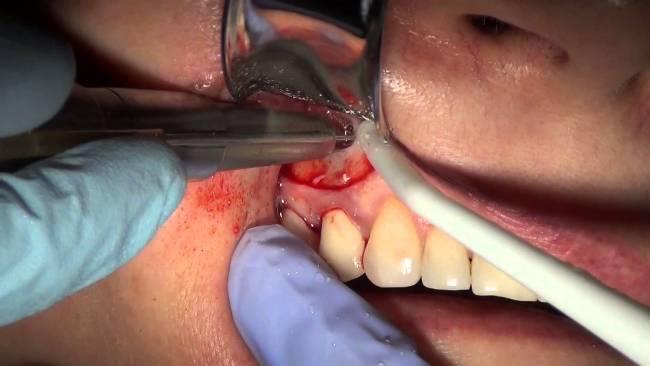Apicoectomy, also known as root end surgery, is an endodontic surgery procedure. It involves the surgical removal of the tip of a tooth root (apex), and the sealing of the root canal. The purpose of an apicoectomy procedure is to fight an infection in the tissues surrounding the tip of the root and save the tooth from extraction.
Unlike root resection, in which an entire root is removed, rather than just the tip. An apicoectomy is the most common type of root canal surgery. The apicoectomy is a surgical procedure usually performed only after a failed root canal treatment.
The majority of failed non-surgical root canals are caused by problems near the tip (apex) of the root. An apicoectomy is an invasive but effective surgical procedure to overcome this kind of problems. Usually, an apicoectomy is the only solution left if the nature of the problems that caused the root canal complications indicates that a re-treatment will not be successful.
An apicoectomy may be needed when an infection develops or persists after root canal treatment or retreatment. During root canal treatment, the canals are cleaned, and inflamed or infected tissue is removed. Root canals are very complex, with many small branches off the main canal.
Sometimes, even after root canal treatment, infected debris can remain in these branches and possibly prevent healing or cause re-infection later. In an apicoectomy, the root tip, or apex, is removed along with the infected tissue. A filling is then placed to seal the end of the root.

Apicoectomy Cost, Success Rate and Recovery
Below you can find all relevant information about cost, success rate and recovery of Apicoectomy. Keep reading.
Apicoectomy Surgery Procedure
First of all, you should know the conditions in which you may require an apicoectomy. This include:
- An unclean root canal blocked by a fractured file that cannot be removed.
- A badly curved root canal obstructing endodontic files from reaching the root tip.
- Several small branches at the sides of the root canal that cannot be cleaned and sealed.
- Other conditions that obstruct healing after a root canal treatment.
- A fracture or crack on the tooth roots.
Apicoectomy Success Rate
In order to improve the apicoectomy success rate, the procedure is usually performed by the endodontist or oral surgeon with the help of a microscope. The microscope is used by the dentist to achieve higher precision. It s also called endodontic microsurgery.
The duration of the procedure depends on the type of tooth involved. The complexity of tooth also matters. But approximately, It may take 30 to 90 minutes. Normally after a successful apicoectomy, any signs of infection will disappear and the bone tissue around the root tip will heal within a few months. An infection that persists after the surgery is indicating an apicoectomy that failed.
Follow-up clinical examinations, as well as x-rays, are necessary to confirm the success of an apicoectomy procedure. Apicoectomy success rate is high if performed by a skilled endodontist. Like all other surgical procedures, there is always a risk of complications and failure. Possible apicoectomy complications are similar to those of the initial root canal treatment. In a case of a failed apicoectomy, the tooth will have to be extracted.
Apicoectomy Recovery Time
Apicoectomies are considered as surgical procedures so it’s natural that you may feel minor discomfort. Apicoectomy recovery is usually quick and without complications. A Little soreness, swelling and pain are absolutely normal after the apicoectomy surgery. Stitches are removed 2 to 7 days after the procedure, and all soreness and swelling are usually gone by 14 days after the procedure.
Apicoectomy Cost
The cost of an Apicoectomy procedure depends upon many variables, mainly it depends on the position of the tooth to be treated. Additionally whether or not any sedation is needed, any follow-up treatment such as crown work and the most determining factor is your living area. But it is considered the last solution to avoid a tooth extraction.
Without dental insurance, an apicoectomy typically costs $900-$1,300 or more, depending on different factors mentioned above such as the position and type of tooth, local rates, and the qualifications and training of the endodontist or oral surgeon performing the procedure.


